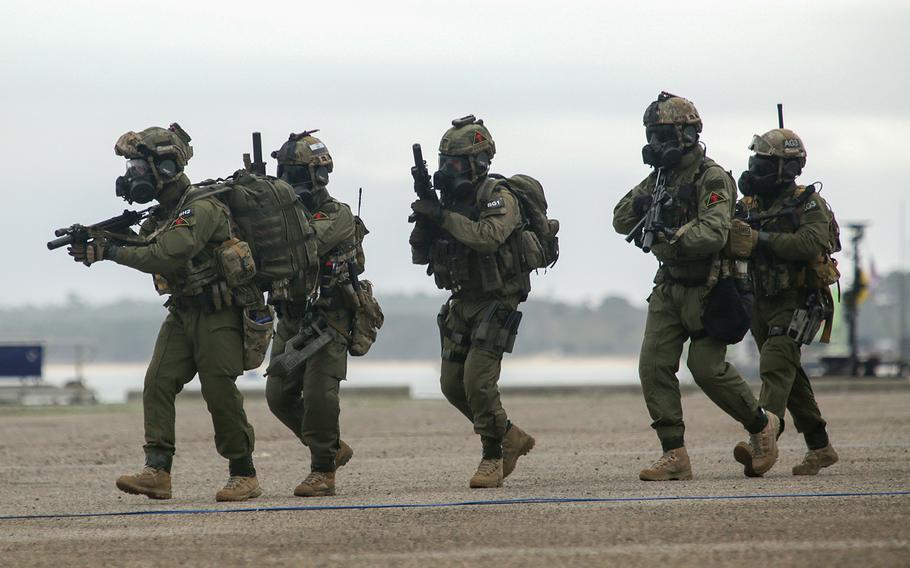Europe
EU finance chiefs seek more defense funds, but question how
Bloomberg February 24, 2024

Marines from Portugal, England and the United States conduct a coordinated beach assault in Troia, Portugal, on Nov. 5, 2015, in front of a crowd of high ranking military generals, political and defense officials from a wide range of NATO countries. (Chad McMeen/U.S. Marine Corps)
European Union finance chiefs are trying to figure out how to fund increased spending needs for defense as the war in Ukraine is about to enter its third year.
“We need to see how we can use the EIB to finance the challenges that we have in Europe,” Belgian Finance Minister Vincent Van Peteghem told reporters on Friday.
Speaking at the start of a two-day meeting with EU counterparts in Ghent, he said that the “green transition is of course one, digital transition is of course one, strategic autonomy and competitiveness is an important one.”
“But in the current global situation defense and security issues is as well an important one,” he said. “So we need to look there at what our opportunities and possibilities are.”
The EU is looking to jump-start its defense industry after years of underspending following the Cold War. While some officials have suggested joint borrowing could be used for this, tapping the European Investment Bank has also been proposed.
Joint bonds
Speaking with Bloomberg Television, Spanish Economy Minister Carlos Cuerpo said common fiscal instruments should be used to improve Europe’s competitiveness as well as to ramp up security.
“There is an important element when we talk about defense, which is the EU defense industry and of course fostering European defense,” Cuerpo said. “There is not only the element of common issuance but also the use of EU institutions to finance these projects.”
That suggestion was rejected by German Finance Minister Christian Lindner, who said he doesn’t see the need for such a move.
Paschal Donohoe, who heads meetings of euro-area finance ministers, acknowledged that funding for defense will be carried out by individual EU governments for now.
“What is happening at the moment is that countries at a national level are making stronger and larger contributions to their own defense and to the defense of Europe,” he said. “Other options will be looked at regarding how we can deepen the security of the EU, but for now, it’s going to continue to be all of the efforts that member states are taking at a national level.”
The defense industry is facing difficulties accessing private finance due to restrictive ESG rules and the EU taxonomy, some member states have warned.
The Czech Republic proposed expanding the green taxonomy to cover social criteria in order to include the defence industry or to introduce financial instruments which reduce the risks banks face by lending to the sector. They’re seeking reassurance from the Commission and the EIB that financing defense wouldn’t impact ESG reporting, according to a proposal seen by Bloomberg.
The idea for a social taxonomy had been shelved by the current commission over concerns that it would be too complicated and divisive to implement.
EIB support
The EIB stepping in may also be difficult as it has previously said it won’t cave in to pressure to invest in defense and a key advisory group to the bloc’s executive, the Platform for Sustainable Finance, has recommended against including defense assets in the EU’s social taxonomy.
Investors might also reject a changed EIB investment profile, with Austrian Finance Minister Magnus Brunner highlighting the threat to the EU lender’s credit rating.
“I am very skeptical, I think it wouldn’t be a good approach to change the EIB’s remit,” he said. “I understand the need of defense investments, but this doesn’t make sense at the EIB. I think the rating and the prestige of the EIB would suffer, so I’m very skeptical.”
Germany’s finance ministry has also said that the EIB’s AAA rating is a priority, though Lindner on Friday said that an expanded approach for the Luxembourg-based lender makes sense.
“The German government strongly backs that the EIB in future also facilitates financing in the areas of defense, armament and security,” he said. “The idea that it might not be socially adequate or desirable to invest in armaments is from a different era.”